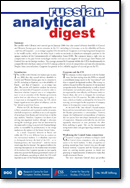After the EU War Report

Can There Be a Reset in Russian-Georgian Relations?
Author(s): Cory Welt
Editor(s): Stephen Aris, Matthias Neumann, Robert Orttung, Jeronim Perovic, Heiko Pleines, Hans-Henning Schröder
Series: Russian Analytical Digest (RAD)
Issue: 68
Pages: 2-5
Publisher(s): Center for Security Studies (CSS), ETH Zurich; Research Centre for East European Studies, University of Bremen
Publication Year: 2009
